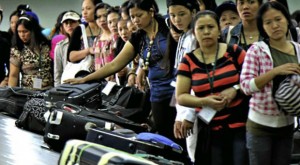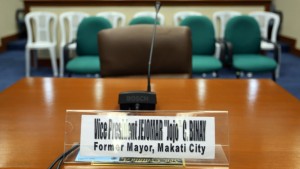Hybrid polls to cost P16B–Comelec
SHARES: 4
VIEW COMMENTS
Philippine Daily Inquirer
04:16 AM July 9th, 2015
Philippine Daily Inquirer
By: Jocelyn R. Uy, July 9th, 2015 04:16 AM

MAN OF THE HOUR Comelec Chair Andres Bautista (2nd from left) responds to a question on the 2016 national elections during the first “Meet the Inquirer Multimedia Forum” on Wednesday, with editors and representatives from Inquirer’s multimedia platforms. Listening to Bautista are (from left) Inquirer.net editor in chief John Nery, Comelec Commissioner Christian Robert Lim and Inquirer publisher Raul Pangalangan. REM ZAMORA
The hybrid voting system would cost the government at least P16 billion, double the amount it would spend if it opts either to refurbish the old precinct count optical scan (PCOS) machines or purchase new voting machines for the 2016 national elections, the Commission on Elections (Comelec) said on Wednesday.
In the hybrid system, called the precinct automatic tallying system (Patas), the voting and counting will be done manually, while the transmission and canvassing of ballots will be automated.
“Our preliminary assessment … [is that] going hybrid will be more expensive than both,” Comelec Chair Andres Bautista said at the inaugural of Inquirer Group’s forum “Meet Inquirer Multimedia.”
Bautista and Comelec Commissioner Christian Robert Lim were the first guests of the media forum, which the Inquirer plans to hold on a monthly basis, showcasing all its platforms—the Philippine Daily Inquirer, Inquirer.net, Radyo Inquirer, Bandera, Libre, Cebu Daily News, its social media and mobile chat applications.
At the forum, Bautista also disclosed that the Comelec en banc was also looking at ways to “resurrect” the option of refurbishing the existing PCOS machines, which he noted may still be the “most cost-effective” solution given the time constraints faced by the election body.
Three options
There are three options that the Comelec is considering for next year’s elections:
— Refurbish the 82,000 PCOS machines, the cost of which is initially pegged at P2.88 billion.
— Lease new optical mark readers (OMRs) in separate quantities—23,000 and 70,9777 units at P2.5 billion and P7.8 billion, respectively.
— Go hybrid, virtually manual elections system.
Bautista said the Comelec’s observations on the hybrid system and the two other viable options, including its calculations of expenses, would be presented at the House of Representatives committee on suffrage and electoral reforms hearing Thursday.
Reports of other stakeholders, including the proponent of the hybrid system, former Commissioner Gus Lagman, will also be tackled at the hearing, Bautista said.
Decision on July 31
Bautista said the Comelec would come up with a decision on July 31.
“I don’t think we can say at this point. But provided that we choose a system, all three options can still be used,” he said.
He added that the Comelec’s “holy grail” was to have a credible election in 2016. “All efforts are geared toward that.”
Patas will require the purchase of laptops and LCD projectors, but the bulk of the expenditures will be on labor since it will need more public school teachers sitting on the board of election inspectors (BEIs), Bautista said.
“You might not just have three but four BEIs, [working] for a longer period. Also you have to factor in the watchers. You’re going to have more watchers and the cumbersome process because it’s like manual [elections],” he said.
More inspectors needed
If the Comelec decides to adopt the hybrid system, it will also need to employ 900,000 election inspectors for the 100,000 polling precincts. But there are only 630,000 public school teachers available to take on such task, Bautista pointed out later in an interview.
Records show that in the 2010 elections, each election inspector was entitled to an honorarium of P3,000 plus P500 for the inspection, verification and sealing of book of voters; P500 for the testing and sealing of the PCOS machines; and P300 for one-time transportation allowance and service credits for three days of service.
Based on the Comelec’s calculations, the hybrid system will cost roughly between P16 billion and P30 billion, according to Bautista.
Lagman estimate
But at a briefing during the end-to-end demonstration of Patas at Bacoor National High School Annex in Cavite province on June 27, Lagman said the entire system would cost the Comelec only around P5 billion, as opposed to the use of either the PCOS machines or the OMRs.
The P5 billion will cover the purchase of laptops, projectors and CCTV monitors, all of which can be later on donated to schools where they were used, Lagman said.
The system might be slower but it has features that will allow for an enhanced transparency in the counting of votes, something that the controversial PCOS machines lacked, he said.
Among these features include the simultaneous tallying of votes in a laptop, which will be shown on a projector screen. Partial results will be sent electronically in a quick-count server that can be picked up from the Comelec website in a 30-minute interval, Lagman said.
“To be honest, if you ask me, hybrid has some promising features but it is still raw and needs further improvements,” Bautista said on Wednesday.
“Look at also the cost, it seems that it is not the cost-efficient choice at the moment. But as I said again, we should give the proponents the opportunity to present as well what they think the cost of the system is,” he added.
Bautista acknowledged that the cost might vary “that’s why I want to … make sure that we are looking at an apples-to-apples comparison.”
Refurbishment
In its effort to revive the refurbishment of the PCOS machines, Bautista said the commission en banc was studying how it could make the project more interesting for companies to bid after it slashed the project’s approved budget for the contract (ABC) from P2.88 billion to P2.074 billion.
The budget was cut on the recommendation of the Comelec bids and awards committee and the initiation of Commissioner Rowena Guanzon based on the components of the refurbishing contract, Lim said.
Bidding challenged
“I think there were several commissioners who really want, as much as possible, to use already what we have, which again makes commercial sense. That’s why we are trying to figure out how we can make sure that we preserve that option moving forward,” Bautista said.
As if gauging which system will provide a more credible and transparent elections next year is not challenging enough, a multisectoral group of petitioners under poll watchdog Automated Election System Watch questioned in the Supreme Court on Tuesday the Comelec’s conduct of parallel bidding for the repair of the PCOS machines and the lease of OMRs.
Bautista said the Comelec would answer the petition when it got a copy but he admitted that he found it “odd” that the same group, which had questioned the commission’s earlier move to engage in direct contracting with technology provider Smartmatic-TIM, was challenging the parallel public bidding.
“The Supreme Court upheld that petition because they said that what the Comelec had to do was to go through a bidding,” Bautista said.
“Now that we are going through a bidding, here they are again questioning why we are going through a bidding and when I think about it, we are just really following the instructions and directives of the Supreme Court,” he added.
Against funding hybrid
In the House of Representatives, Caloocan Rep. Edgar Erice said the committee on suffrage and electoral reforms would not allocate funds to the Comelec should it decide to drop the PCOS machines.
Erice, committee vice chair, noted that the proposed budget for Patas was “astronomical” and that the hybrid option was illegal.
“I don’t think [Patas is] feasible. The test run was not successful. I maintain that the law requires automation both in the precinct voting and transmission,” Erice said.
“They have to change the law and I don’t think they can convince Congress to appropriate funds for such a failed system,” Erice added.
Capiz Rep. Fredenil Castro, chair of the committee, said he could not understand why Bautista would continue to keep an open mind on the hybrid system despite the disastrous results of the dry run last month.–With a report from Gil C. Cabacungan
RELATED STORIES
Disclaimer: Comments do not represent the views of INQUIRER.net. We reserve the right to exclude comments which are inconsistent with our editorial standards. FULL DISCLAIMER
For feedback, complaints, or inquiries, contact us.
POPULAR
ABS-CBN teen actress found dead
July 8th, 2015
Julia Buencamino showed ‘no sign she was depressed’
July 8th, 2015
‘Call center employee’ hurt in Makati road mishap
July 8th, 2015
Nonie, Shamaine and Delphine Buencamino—‘No, we’re not royalty’
December 7th, 2012
China stakes out Recto Bank
July 8th, 2015
Peña closes Makati Friendship Suites
July 8th, 2015
The misery of being Filipino
July 7th, 2015
5 Binay ‘dummies’ no-shows in 22nd Senate graft hearing
July 8th, 2015
LATEST VIDEOS
LATEST FROM INQUIRER POP
Read more: http://newsinfo.inquirer.net/703972/hybrid-polls-to-cost-p16b-comelec#ixzz3fKwS7iGh
Follow us: @inquirerdotnet on Twitter | inquirerdotnet on Facebook



























